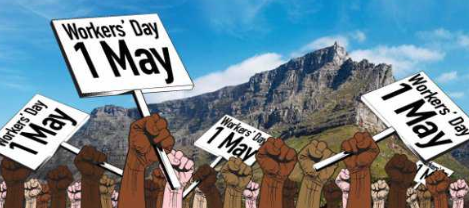Opinions
2022 MAY DAY: Celebrating The Unhappy Nigerian Workers

By Mukhtar Ajelogbon
Yesterday was May 1st and the drums were out to celebrate workers in most parts of the world.
Globally, the official name for Workers’ Day is International Workers’ Day and it is celebrated in most countries on May 1st. It is also called May Day, Labour Day and majorly celebrated all over the world in the month of May. Indeed, with most countries like Nigeria, Workers Day is a public holiday.
However, some countries celebrate on other dates they find suitable; such as the United States of America and Canada, that celebrate Labour Day, on the first Monday of every September. In Australia, Labour Day is celebrated on certain Mondays in the months of March, May and or October, depending on the part of Australia! Other countries which celebrate Labour Day on dates different from May 1st includes Jamaica, Kazakhstan, United Kingdom, New Zealand, Trinidad and Tobago, Bangladesh and The Bahamas. In Saudi Arabia and Qatar, International Workers Day is not celebrated as a public holiday.
During the Cold War period, the world was divided along the line of two ideologies; Communist East and Capitalist West with a few countries that decided to be none aligned to any of the two ideologies.
At origin, May Day was born out of the struggle for workers to enjoy better working hours (8 hour workday) and conditions, by embarking on a strike on May 1. This led to a protest on May 4, 1886, at Haymarket Square, Chicago, U-S, by a Labour Union Movement, advocating for a maximum of eight hours of work per day, elimination of child labour and abuses from employers. The protest resulted in the deaths of some of the protesters and policemen dispersing them. Although the Union’s objective to regulate the number of working day hours was not achieved until the late 1880s, the protest still remains a significant reference point in the history of Workers Day, as we know it today. Thus, in 1889, the International Workers’ Congress in Paris declared May 1st an eight hour holiday. The International Labour Organisation supervises and manages the affairs of labour issues worldwide.
In Nigeria, labour system is rich in history. From the period of the nation’s colonization where the colonial masters took advantage of the cheap labour to the time of independence, workers in Nigeria have toiled long and hard to fulfil the dream of their forefathers. Therefore, the International Workers’ Day, held on 1st May (in over 140 nations) is an avenue to celebrate the working class for their commitment, service, selflessness, loyalty, and sacrifice.
In Nigeria, the first Workers’ Day holiday was declared in 1980 by the government of the People’s Redemption Party in Kano and eventually became a national holiday on 1st of May, 1981.
All through history in Nigeria, Labour Unions and their members have used the avenue to highlight the challenges of labour, the somewhat diminished significance of the working class all over the country and an action call for improved welfare for its members. Government, as a major employer of labour, seizes the opportunity of the holiday to make promises on ways to improve the working conditions of employees.
The approved increase of minimum wage to Thirty Thousand Naira, from Eighteen Thousand Naira is yet to be met, while there are demands and promises made on each Workers’ Day in Nigeria, it is not all doom and gloom, as workers, from across the country, commemorate the day through celebrations across all the states of the federation. The history of the labour movement cannot be complete without the mention of people like Late Pa Michael Imodu, Mallam Ciroma, Alhaji Hassan Sunmonu, Mr. Pascal Bafyau and Mr. Adams Oshiomole to mention but a few. They did play their parts in the fight for welfare of workers over the years.
May Day is also marked with workers’ demonstrations to display their plight or displeasures. This is common in most parts of the world but it is more prevalent in the former communist countries. This year’s celebration is taking place at a trying time for Nigerian workers as Academic Staff Union of Universities (ASSU) are on strike to press further their demands from the federal government, while the unbelievable body of workers in Nigerian (NLC) threatened to go on a warning strike in solidarity to ASSU and Nigerian Students.
In conclusion, working class citizens are the epicentre of May Day celebration. Their contributions towards a united and developed Nigeria are what make the commemoration of Worker’s Day one of the most important holidays in the country. Hence, May Day celebration as a national holiday is to honour the unsung heroes whose sacrifices sometimes go unnoticed. This week commentary salutes the courage, resilience and tenacity of purpose of the Nigerian Worker. Long Live the Labour Movement, Long Live Nigeria! Aluta Continua.
-

 Celebrities3 days ago
Celebrities3 days agoOriyomi Hamzat hospitalised after Ibadan stamdpede
-

 Metro/Crime5 days ago
Metro/Crime5 days agoNigerian varsity lecturer assassinated
-

 Celebrities7 days ago
Celebrities7 days agoSeven Doors: Muyiwa Ademola Breaks Silence Over New Role
-

 News3 days ago
News3 days agoOoni’s Ex-Wife Arrested Over Alleged Death of 35 Children In Ibadan
-

 Weird News6 days ago
Weird News6 days agoHusband Burns Wife, K!lls Self in Ondo
-

 News3 days ago
News3 days agoOoni breaks silence over Ibadan stamdpede, sends message to party involved
-

 News5 days ago
News5 days agoState Govt seals churches, other establishments
-

 Politics5 days ago
Politics5 days agoBola Tinubu Approves Eight New Appointments (Full List)





